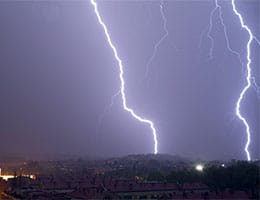 A roar is a powerful noise that generates a commotion . When an individual hears a noise, said sound catches his or her attention due to its particular characteristics. For example: “What was that noise? It sounded like an explosion” , “When the building collapsed, the roar was heard throughout the neighborhood” , “I will never forget the noise the helicopter made when it collapsed in the field” .
A roar is a powerful noise that generates a commotion . When an individual hears a noise, said sound catches his or her attention due to its particular characteristics. For example: “What was that noise? It sounded like an explosion” , “When the building collapsed, the roar was heard throughout the neighborhood” , “I will never forget the noise the helicopter made when it collapsed in the field” .
Explosions and explosions cause a roar. If something explodes, it suddenly and violently releases sound, light and heat energy. These waves propagate in space and can travel great distances.
Suppose a terrorist group explodes a bomb in the middle of a city. The roar produced by the detonation will surely be heard in several neighborhoods, even a few kilometers away from the site of the explosion.
A collision between two cars traveling very fast, a house that collapses due to a failure in its structure, a plane taking off, and a moving train also produce noise.
Sometimes a roar occurs when many people demonstrate simultaneously. In a soccer match, when a player scores a goal and those in the stadium shout and celebrate at the same time, a roar is generated. The same thing happens at the beginning of a concert when the artists appear on stage and people express their joy.
A noise, in short, is a noise that disturbs tranquility. Due to the intensity of the sound, a sleeping subject may wake up to a noise, for example.
By closely studying its etymology, we discovered that the term rumble derives from the Latin word tonitrus (which is defined as " thunder ") preceded by the prefix, also Latin, ex- . To reach the form -truendo , the Latin word had to go through several phenomena, among which are the metathesis of the r, the voicing of the te between two vowels, the syncopation that caused the fall of the i and the diphthongation of the o.
 According to the research of Joan Coromines i Vigneaux , a philologist and etymologist born in Barcelona in 1905, the element es- of the word rumble arose by analogy with many others also coming from Latin that are used to describe noises of great force. , such as explosion, bang and crash. Coromines arrived at this deduction since he did not find any trace of vulgar formations such as "extonitrare" in Latin.
According to the research of Joan Coromines i Vigneaux , a philologist and etymologist born in Barcelona in 1905, the element es- of the word rumble arose by analogy with many others also coming from Latin that are used to describe noises of great force. , such as explosion, bang and crash. Coromines arrived at this deduction since he did not find any trace of vulgar formations such as "extonitrare" in Latin.
The Latin term tonitrus also gave rise to the birth of embrasure, thunder and thunder, more examples of concepts associated with noise in our language. To find its origin we must refer to the verb tonare (which in our language can be understood as "thunder"), from which we also receive "attire" and " detonate ". This verb is linked to nouns like "thunder" and verbs like "rumble."
In addition to the noun rumble , we have at our disposal the adjective thunderous , which serves to refer to a noise with the characteristic of being especially booming, powerful and deafening. Given that the concept of noise is implicit in its meaning, talking about "loud noise" may seem redundant, but it serves to emphasize its power and the effects it has on listeners. Regarding its use in everyday speech, it is not so common, but simpler terms are preferred, such as "strong" or "powerful."
In the universe of Pokémon , a series of Japanese video games of considerable popularity worldwide, there is a sound movement called rumble , which serves to cause damage and does not carry side effects. If executed in a double or triple battle , it hits all Pokémon in a position adjacent to the user.
